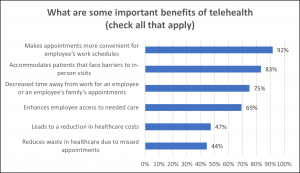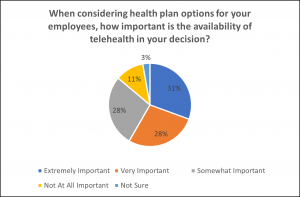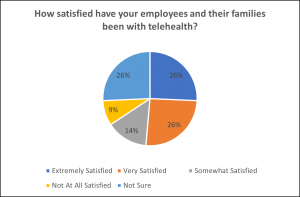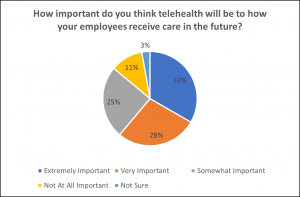Employers Value Telehealth’s Convenience But Are Skeptical About Its Impact on Cost, MHQP/AIM Study Shows
(October 2023)

When telehealth usage surged during the pandemic as a safe way for patients and providers to interact, MHQP conducted a series of surveys among providers and patients to provide real-time feedback to the field about this rapidly evolving tool. The input we received was extremely valuable in helping us determine what was working well and what could be improved with telehealth.
Now, as the pandemic has entered a new phase and we begin to look at the future of telehealth in Massachusetts, we have sought feedback from another key stakeholder group – employers. As the primary purchasers of healthcare services, employers offer valuable perspectives and their voices may be key to determining the future of telehealth in our state.
Earlier this year, in partnership with Associated Industries of Massachusetts (AIM), we developed and fielded a survey among human resources representatives at Massachusetts-based companies to better understand their perceptions of telehealth. Representatives of 36 companies responded. The rich data provided mixed opinions, in contrast to the overwhelmingly positive opinions we have heard about telehealth from patients (i.e., their employees). While telehealth is clearly here to stay, this divergence of perceptions may hint to some challenges ahead.
In summary, the survey found:
- A large percentage of respondents said they value the convenience telehealth offers, while benefits related to cost control and waste reduction were valued less.
- Respondents were generally supportive of telehealth as an important component of the health plans offered to employees, and were mostly enthusiastic about their employees’ satisfaction with telehealth and the role telehealth can play in the future of care.
- The respondents who were less enthusiastic about telehealth pointed primarily to issues of value and quality as their main concerns. Responses signal that the convenience of telehealth is seen as a benefit for their employees but that the price point for the effective use of telehealth has not yet translated into premium or other cost savings for the account, or their employees, under the current structure.
Convenience, Not Cost Control
When asked about the benefits of telehealth, respondents pointed mostly to factors related to convenience and access. 92% of all respondents said that telehealth makes appointments more convenient for employees. 83% said it accommodates patients who face barriers to in-person visits. 75% said it decreases time away from work for an employee or an employee’s family. 69% said it enhances employee access to needed care.

Here are some of the verbatim comments from respondents explaining why they value telehealth’s convenience factor:
- “Telehealth has the potential to generate short- and long-term productivity gains. In the short-term employees save time when choosing a telehealth visit versus an in-person visit. It could mean the difference between a 30-minute telehealth visit versus the entire afternoon when travel time and office wait time is included. Over the long-term, research has shown that telehealth appointments are more likely to be kept, which may lead to better overall employee wellness, resulting in fewer sick days.”
- “We consider telehealth to be part of a comprehensive health benefit package. Telehealth provides our employees with access to high quality healthcare in a convenient and cost-effective manner.”
- “Remote workers with disabilities find it invaluable.”
- “There is more flexibility and accessibility.”
- “Employees want it. It saves a tremendous amount of time and also maybe efficiency to free up providers.”
- “We are located in a rural area and there is a general shortage of primary care physicians.”
- “We are a business that runs 24/7. Having telehealth available for our employees is very important.”
- “Sometimes it’s very hard to get in to see your provider and if it’s something that can be done via telehealth it makes it easier on our employees.”
- “Telehealth is an option that might make access to health care more convenient for the customer (the patient). What a concept!”
- “During the COVID pandemic, telehealth helped considerably.”
- “Fewer absences for medical appointments.”
- “They don’t have to take a whole morning or afternoon off for a 15 minute appointment.”
Less popular were benefits related to cost control and waste reduction. 47% said an important benefit of telehealth is that it leads to a reduction in healthcare costs. 44% said it reduces waste in healthcare due to missed appointments. Given the relatively short time that telehealth has been widely available and the fact that telehealth payments have been mandated by emergency regulation for much of this time, it is likely too early to determine if telehealth will lower costs over the long term.
How Important Is Telehealth to Employers?
When asked “When considering health plan options for your employees, how important is the availability of telehealth in your decision?”, 58% of respondents said “Extremely Important” or “Very Important,” while 42% responded “Somewhat Important,” “Not At All Important,” or “Unsure.”

When asked “How satisfied have your employees and their families been with telehealth?”, only about half (52%) said either “Extremely Satisfied” or “Very Satisfied,” while 48% said “Somewhat Satisfied,” “Not At All Satisfied,” or “Not Sure.”

This modest level of enthusiasm was surprising, given that patients have expressed extremely high levels of satisfaction with telehealth. In MHQP’s 2021 survey, for example, 89% of patients reported their telehealth experiences were “Excellent” or “Very Good.” That percentage dipped to 81% in the 2022 survey, but this was still significantly higher than the perceived satisfaction reported by employers.
Value and Quality Concerns
Respondents who were less enthusiastic about telehealth focused primarily on issues related to value and quality as their main concerns. Here are some of their comments:
- “We are hearing that employees would prefer to see the Dr. in person, as their needs can’t be adequately addressed. We know of one case of an elderly family member poorly cared for…The care is not as robust!”
- “Should be less money than an in-person visit…because they’re quicker, shorter appointments.”
- “The cost is too high and they would rather meet in-person…Very hard to determine health issues via telehealth…We are not a fan of telehealth.”
- “Telehealth can be a conversation. The provider cannot conduct any of the physical measures that are part of health care. And you really need a strong in person relationship to form a foundation for a telehealth relationship.”
Looking to the Future
When asked “How important do you think telehealth will be to how your employees receive care in the future?”, 61% said “Extremely Important” or “Very Important,” while 39% responded “Somewhat Important,” “Not At All Important,” or “Unsure.”

Again, this signals only modest support among this key stakeholder group. While many HR managers seem to have strong convictions that telehealth adds significant value to their employees’ healthcare experiences and have high hopes that telehealth will play a major role in their employees’ care in the future, others seem less certain and question its value compared to in-person visits. These mixed opinions underscore the need to more deeply understand the disconnect between the perspectives of employers and employees and may highlight the many challenges telehealth will continue to face in the future.
